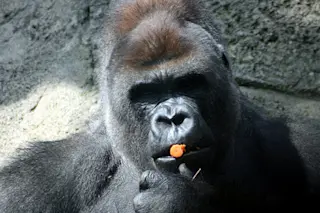As animals get bigger, so do their brains. But the human brain is seven times bigger than that of other similarly sized animals. Our close relative, the chimpanzee, has a brain that’s just twice as big as expected for its size. And the gorilla, which can grow to be three times bigger than us, has a smaller brain than we do.
Many scientists ask why our brains have become so big. But Karina Fonseca-Azevedo and Suzana Herculano-Houzel from the Federal University of Rio de Janeiro have turned that question on its head—they want to know why other apes haven’t evolved bigger brains. (Yes, humans are apes; for this piece, I am using “apes” to mean “apes other than us”).
Their argument is simple: brains demand exceptional amounts of energy. Each gram of brain uses up more energy than each gram of body. And bigger brains, which have more neurons, consume ...














